”As of July 1, 2020 the Prime Minister will be able to bring the agreement reached with the United States regarding the application of sovereignty for discussion by the cabinet and the government and for the approval of the government and/or the Knesset.” (Article 29 of the national unity government)
Application of Israeli sovereignty to the Jordan Valley and parts of the West Bank is a historic opportunity. According the national unity government deal PM Netanyahu can bring his proposal regarding the application of sovereignty to government as of 1st July 2020. It is a difficult strategic dilemma: Annex now during coming months or not, how much to annex, how big are the risks in West Bank, in Israeli borders and internationally, does ”window of opportunity” close after US presidential elections on November 2020 in case Mr Trump’s rival Joe Biden – who opposes annexation – is elected and reverses US policy?
Israeli Defense Minister Benny Gantz instructed already 1st June the IDF chief of staff, Lieut. Gen. Aviv Kochavi, to speed up the military’s preparations for developments on the Palestinian front, including the country’s planned annexation of parts of Judea and Samaria. Gantz is believed to have asked Kochavi to present the IDF’s plans for a possible escalation of violence in Judea, Samaria and Gaza. The IDF has been preparing for annexation-related scenarios for the last six months.
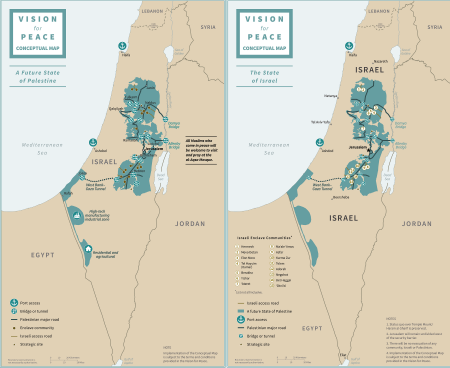
Two-States according Deal of Century (Trump Peace Plan)
Annexation?
Annexation is the term applied when a state unilaterally proclaims its sovereignty over other territory. and many international institutions look that it is forbidden by international law. Many international organizations and states have view that extension of Israeli law and jurisdiction to West Bank is against international law. Some experts, especially in Israel, claim opposite as there is no another state in West Bank or making claims for that territory. A recent example of annexation was Russia’s annexation of Ukraine’s Crimea peninsula in 2014, but this approach of international law – whatever it is – is also flexible as seen e.g. in case of Kosovo earlier. However in this article I use ”annexation” as a general, not legal, term.
In terms of territory, Judea and Samaria (West Bank) have not been parts of any sovereign state since the fall of the Ottoman Empire over 100 years ago. Israel, which has controlled those territories since 1967, possesses the only strong claim to sovereignty—but it has never actually claimed that sovereignty. After Ottoman rule West Bank was part of British mandate agreed to serve as Jewish homeland in San Remo 1920. After UN partition plan 1947 – which was accepted by Jewish organizations but not by local Arab representatives, Jordania attacked and occupied West Bank until Israel took it back in Six-Days-War 1967. Jordan and Israel made peace agreement in 1994 where the international boundary between Israel and Jordan follows the Jordan and Yarmouk Rivers, the Dead Sea, the Emek Ha’Arava/Wadi Araba, and the Gulf of Aqaba. The section of the line that separated Jordan from the West Bank was stipulated as “without prejudice to the status of [that] territory.”
One of the most significant differences between annexation and current situation is in settlement construction. Currently, building and zoning in the West Bank requires the approval of Israel’s defence minister and prime minister, and can take months or years. Following annexation, it would become a local matter and consequently easier for Israel to build there.
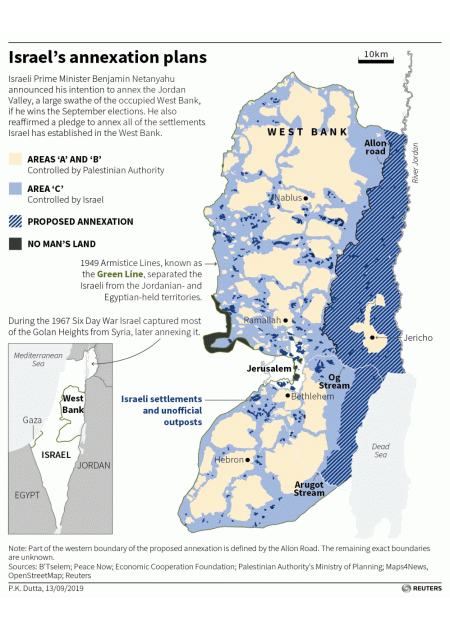
Starting point, exact boundaries are at planning stage or negotiated with Palestinians.
The area
In public debate there has been views that Israel is annexing, or should annex, the entire West Bank, the sc One-State-Solution as its outcome. However areas earmarked for annexation (the precise contours of which are being mapped by Israel and the US) may comprise about 30% of the West Bank according to Trump peace plan (Peace to Prosperity )
Under the Trump peace plan, which Israel has accepted, Israel can and should declare its sovereignty, and extend its civilian law, over the portions of Judea and Samaria it’s capable of governing effectively and efficiently without military support. So the specific areas that Israel is considering annexing are already primarily Jewish, and already under Israeli control, they are located in area C agreed with Palestinians in Oslo Accords in 1993
One scenario is a plan for “gradual” Israeli annexation in the West Bank, Mr Netanyahu might initially act to annex just the settlements, which could amount to only 3%, and the remaining 27% later on once the boundaries are agreed with Washington or Palestine Authority.
Gershon Hacohen /BESA gives another aspect which is Israel’s growing residential and infrastructure density. He sees annexation as ”a golden opportunity to develop the West Bank communities. This means that the application of sovereignty calls for the strategic governmental formulation of a new national master plan for the development of Israel’s eastern rampart. The master plan, according Hacohen, could include e.g:
- To consolidate Jerusalem as a metropolitan city while developing circumferential transportation and municipal infrastructures
- To fully utilize the open corridor from Jerusalem to the Dead Sea for the saturation construction of hundreds of thousands of housing units.
- turning the Jordan Valley, up to the eastern ridge lines in Samaria, into a tract of continuous settlement for the absorption of two to three million Israelis.
All these trends exist in Area C, and they offer a guiding framework for organizing the infrastructures of the Palestinian entity in lands controlled by Israel.
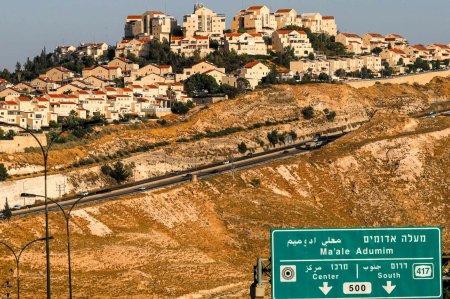
One of the Israeli settlements in West Bank, Ma’ale Adumim. Photo credit AFP
" aria-describedby="caption-attachment-6392" data-orig-size="1600,1062" sizes="(max-width: 450px) 100vw, 450px" data-image-title="maaleA" data-orig-file="https://arirusila.files.wordpress.com/2020/06/maalea.jpg" data-image-meta="{"aperture":"0","credit":"","camera":"","caption":"","created_timestamp":"0","copyright":"","focal_length":"0","iso":"0","shutter_speed":"0","title":"","orientation":"0"}" width="450" data-medium-file="https://arirusila.files.wordpress.com/2020/06/maalea.jpg?w=300" data-permalink="https://arirusila.wordpress.com/2020/06/28/west-bank-annexation-a-window-of-opportunity-or-an-apocalyptic-nightmare/maalea/" alt="" height="299" srcset="https://arirusila.files.wordpress.com/2020/06/maalea.jpg?w=450&h;=299 450w, https://arirusila.files.wordpress.com/2020/06/maalea.jpg?w=900&h;=598 900w, https://arirusila.files.wordpress.com/2020/06/maalea.jpg?w=150&h;=100 150w, https://arirusila.files.wordpress.com/2020/06/maalea.jpg?w=300&h;=199 300w, https://arirusila.files.wordpress.com/2020/06/maalea.jpg?w=768&h;=510 768w" class="size-large wp-image-6392" data-large-file="https://arirusila.files.wordpress.com/2020/06/maalea.jpg?w=450" />One of the Israeli settlements in West Bank, Ma’ale Adumim. Photo credit AFP
Different views
“Our future doesn’t depend on what the Gentiles will say, but on what the Jews will do.” (David Ben-Gurion)
The declared intention for the implementation of sovereignty in certain parts of the West Bank is prompting vigorous debate in Israel. The matter of applying Israeli sovereignty to certain areas of the West Bank has been disputed both Israeli right-wing and left-wing camps.
Right-wing camp highlights the security risks and that Palestinian Authority (PA) would get half of the Area C – which is agreed to be under Israeli administration due Oslo accords – in addition to Area A and B, which are now full or partial under PA. Settlement leaders are not keen on annexation, either. They have launched a public campaign against the Trump plan. They say annexation would risk opening the door for a Palestinian state while ending any expansion of Israeli settlements in much of the West Bank. .
The left-wing camp, backed by many former army officers and public servants, sees more risks than and opportunity; so far, as the details and terms of annexation can make it more attractive. Leftist view has been that annexation would be counterproductive if not completely fatal for the prospect of an eventual two-state solution. Blue and White party leader Benny Gantz stipulating that they would seek to advance the Trump plan “while pursuing the security and strategic interests of the State of Israel, including the need to maintain regional stability, preserve peace agreements and pursue future peace agreements”.
Some Israeli commentators anticipate swift and terrible ramifications of a decision to annex parts of the West Bank. Their darkest visions include e.g.
- an intensification of violence between Israel and the Palestinians,
- a severing of relations by Jordan and Egypt, which might even go so far as to nullify their peace treaties with Israel,
- the Gulf States that have been tacitly cooperating with Israel on security and intelligence fronts will end their cooperation,
- the EU will condemn Israel in the strongest possible terms,
- scores of countries will recognize the Palestinian state,
- the BDS movement will significantly intensify,
- antisemitism will reach new heights.
The problem with annexation of Jordan valley is the matter of control of the West Bank’s main traffic corridors. From a security standpoint, IDF should remain in charge of security on the ground. It questionable if the completion of bypass arteries, bridges and tunnels are enough.
As Area C already is in Israel’s control, the annexation could happen with a vote in Israel’s parliament but in practice with almost no changes on the ground. However, if Israel formally declares land as part of its state, it would make it even more difficult to give it up in any future agreement. The main problem would be, that reversal would require in Knesset the support of a large majority (66%) of Israeli MPs and as I understand, that this something which is very unlikely.
My rhetorical question: Does anyone think (except some Palestinian leaders publicly) that this “settlement” would be given to State of Palestine in any possible Peace Deal? City of Ariel (founded 1978) located between -67 line and security barrier in West Bank:Global response to annexation?
“We can disagree with Israel on political issues and still cooperate in other areas, such as the coronavirus and technological matters,” (FM Anwar Gargash, UAE)
Global response to annexation is negative. Sure the Palestinians are against and calling for international pressure. The UN has warned that annexation would most likely trigger conflict and instability in the West Bank and Gaza Strip. However, the US is likely to block any attempts to pass resolutions at the UN Security Council condemning Israel.
Jordan has said it would be forced to review its relations with Israel if annexation goes ahead. One reason for hardline statements might be that the US call for is naturalizing the Palestinian refugees in Jordan, which is considered by the regime as a severe threat to Jordan’s stability.
Egypt has traditional solidarity with the Palestinians and with their demand for an independent and sustainable state based on the 1967 borders. A Egyptian national interest is the desire for a renewal of negotiations on an Israeli-Palestinian settlement, which will contribute to regional stability and could – according to the Trump plan – lead to projects worth billions of dollars in Egypt’s own territory.
The Arab world has sharply criticised Israel’s plans. The EU – Israel’s biggest trading partner – says it will use diplomatic means to “discourage” Israel from carrying out its plans. Some member states have called for tougher action, including possible sanctions.
Probably annexation will negatively affect Israel’s relations with the Gulf states. their public opposition to the annexation will likely continue, but so will their quiet security cooperation with Israel, particularly in light of the common interest of curbing Iran’s regional and nuclear aspirations.
In my opinion the global response will be verbally hard against annexation, it will be condemned but as usual there will no meaningful countermeasures as outcome.
Palestinian Authority has opportunity to negotiate a better deal
”Every Time Palestinians Say ‘No,’ They Lose” (Bret Stephens)
Palestinian Authority has opposed annexation and Trump peace plan even before it was published. Again the Palestinians seems to be the only nation that ever said “no” to an offer of independence with international support.
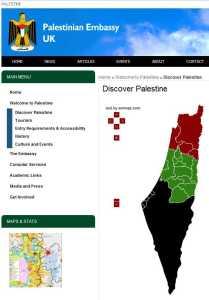 PA declared on May 2020 they’re no longer bound by the 1990s-era peace accords that govern Israeli-Palestinian relations, and have begun refusing to coordinate with Israel on matters of daily Palestinian life, from tax collection to policing to cancer treatments — arrangements they’ve found humiliating. The even didn’t took corona aid from UAE as the aid-cargo came via Ben Gurion airport. Ordinary Palestinians are paying the price for the disruptions in funds, policing and medical care. Palestinian authorities also refuse to coordinate with Israel to allow Palestinian patients to travel outside the impoverished Gaza Strip for life-saving treatments, according to Physicians for Human Rights-Israel.
PA declared on May 2020 they’re no longer bound by the 1990s-era peace accords that govern Israeli-Palestinian relations, and have begun refusing to coordinate with Israel on matters of daily Palestinian life, from tax collection to policing to cancer treatments — arrangements they’ve found humiliating. The even didn’t took corona aid from UAE as the aid-cargo came via Ben Gurion airport. Ordinary Palestinians are paying the price for the disruptions in funds, policing and medical care. Palestinian authorities also refuse to coordinate with Israel to allow Palestinian patients to travel outside the impoverished Gaza Strip for life-saving treatments, according to Physicians for Human Rights-Israel.
Palestinian officials are now refusing to accept any of the tax revenues Israel collects on their behalf, leaving tens of thousands of Palestinian civil servants unlikely to get full paychecks this month. The $145 million a month Israel transfers to the Palestinians is estimated to make up about 60% of the Palestinian Authority’s budget.
The Trump peace plan violates no agreement as such. It sets out an ostensible framework for peace between the Palestinians and Israel, including the establishment of a Palestinian state and the granting of considerable economic benefits for the Palestinian people. In my opinion exactly Palestinians have now window of opportunity to get a good deal and finally their own state. And exactly now in coming months when President Trump is in office and wants to make his ”Deal of Century”, winn the next elections and maybe get the Nobel peace prize. So Palestinians have now excellent cards in their hands to get best possible deal for them.
My view
The fundamental principle, recognised by Britain’s Peel Commission in 1937 and by the fledgling United Nations in 1947, that the only way to resolve the conflict is to partition the Palestine into separate Jewish and Arab states, guaranteeing national self-determination for both peoples who claim it as their own.
Comprehensive peace proposals were presented to Palestinian leadership three times in the past – once by the United Nations (1947) and twice by Israel (2000, 2008). All three times, Palestinian leadership rejected broad peace deals, while Israel said yes.
As White House finally published its ”Peace and Prosperity plan” (Deal ofCentury/DoC) , I commented it as follows:
I agree with President Trump that his Vision is the most serious, realistic, and detailed plan ever presented, one that could make Israelis, Palestinians, and the region safer and more prosperous. In my opinion even at minimum it creates updated framework for possible Israeli-Palestinian negotiation as well possible one-sided Israeli actions if negotiations don’t start. DoC is just the first step and provides the basis for historic progress toward peace. Anyway the best aspect with DoC in my opinion is that it simply mirrors the reality on the ground as it exists today in the West Bank and not high-flown ideas and utopies.
In my opinion the DoC could be even better. From my point of view the map would be more clear if Israel would annex only some 200,000 Israelis who live in the 12 Jewish neighbourhoods of East Jerusalem and the second group of some 300,000 Israelis who live in the so called ‘settlement blocs,’ located west of the security barrier which are usually very close to the Green Line. This kind of approach could be described as constructive unilateralism as this kind of annexation is not foreclosing the possibility of a future Palestinian State and sc Two-State-Solution. The rest 90,000 settlers – less than 20 per cent of the entire population of those living beyond the Green Line – who live beyond the route of the security barrier, could be, if so agreed after possible negotiation with PA, relocated inside barrier and future border.
David Ben-Gurion faced a similar dilemma in 1937 when accepting the Peel Commission’s partition plan, which offered the prospective Jewish State a small fraction of the territory of mandatory Palestine. “The Jewish state now being offered us… is not the Zionist goal, but it could serve as a decisive stage on the way to realizing the larger Zionism,”
A Palestinian counteroffer of direct talks with Israel might be the best and pragmatic approach to resolving the conflict of the century. In my opinion this would be a win-win outcome for Israel, Palestine and President Trump.
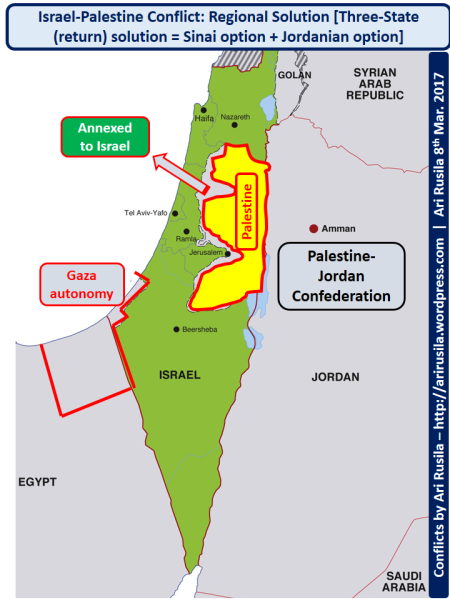
Best solution in my opinion: Spatial separation with Jordanian and Sinai options
Sources:
BESA Center Perspectives Paper No. 1,606, June 15, 2020 ,
Trump peace plan ,
al-Jazeera ,
Council on Foreign Relations ,
Dr. Raphael G. Bouchnik-Chen/BESA in The Jordan Valley Annexation Dilemma: A Realistic Approach ,
INSS: A Strategic Framework for the Israeli-Palestinian Arena ,
My related articles:
Deal of Century finally released ,
Constructive Unilateralism (II) as Solution to Israeli-Palestinian Conflict,
Herzog’s Plan: Security Barrier Around the Major Settlement Blocs of West Bank ,
Analysis: Resolving The Israeli-Palestinian Conflict

